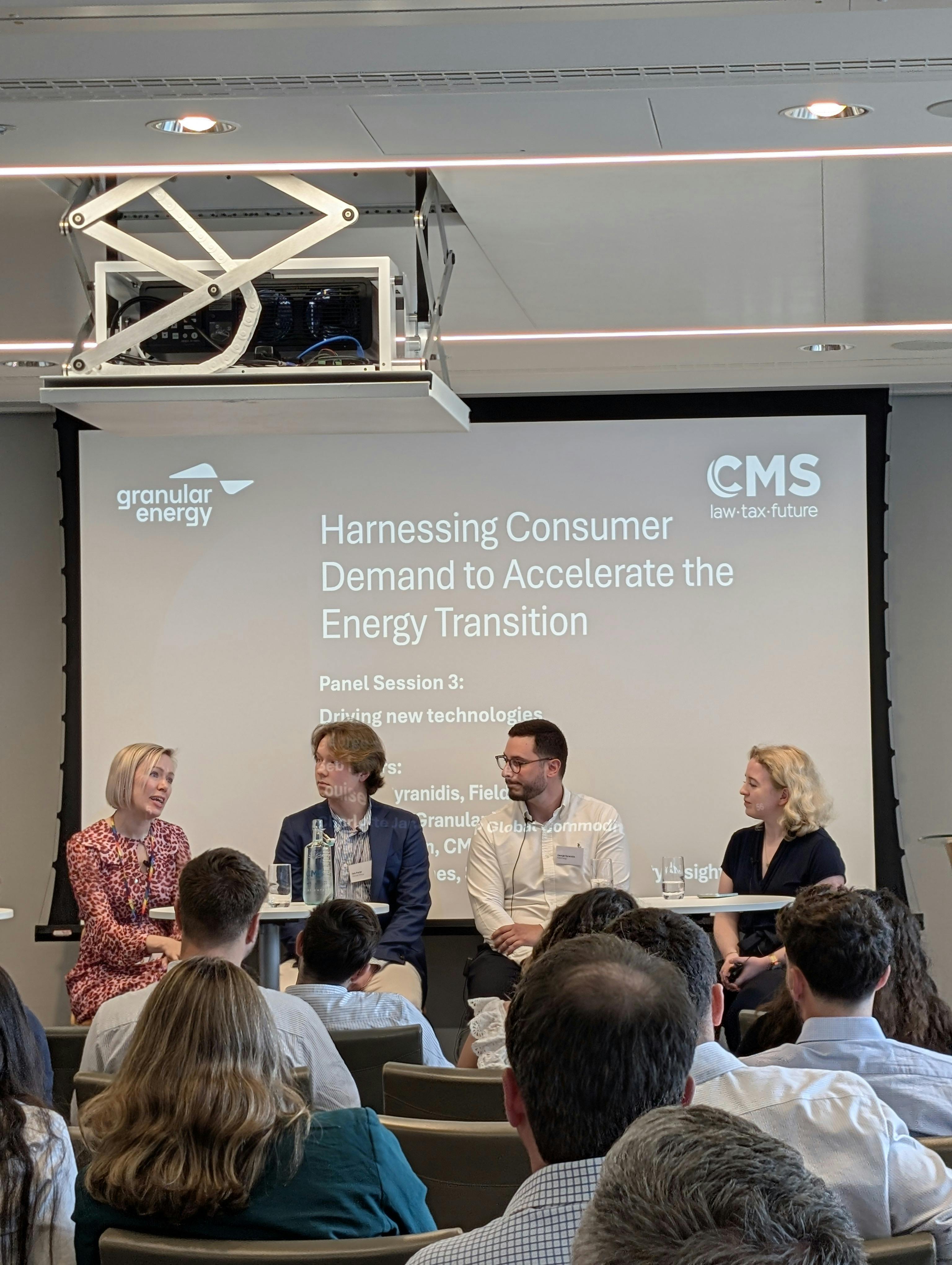Insight · 19 May 2025
Navigating a shifting landscape: key insights from our clean energy procurement workshop
On May 12th, we co-hosted an event alongside CMS to discuss shifting trends in clean energy procurement. We welcomed industry experts from energy supply, energy buyers and other market participants to share their expertise and thoughts. Read the event key takeaways.

On May 12th 2025, Granular Energy and CMS hosted almost 70 energy professionals – spanning suppliers, large energy buyers, industry analysts and market players – in London to discuss the evolving dynamics of clean energy procurement. The event, “Harnessing Consumer Demand to Accelerate the Energy Transition,” sparked insightful conversations about the challenges and opportunities ahead. Here are 8 key takeaways.
Climate action in the hands of the private sector
Opening the event, our CEO Toby highlighted the accelerating urgency of climate action and the increasing responsibility of the private sector, responding to the political forces backtracking on climate commitments. While UK wind power generation now rivals gas, achieving a reliable and affordable grid with high renewable penetration presents significant hurdles, illustrated by recent events like the Spanish blackout.
Policy and standards: a need for clarity & granularity
The Greenhouse Gas Protocol, currently under review, is travelling towards more granular reporting, going down to an hourly level, as well as more geographical limitations. We expect a new version in 2027 - and in the meantime, corporates are following closely changes (and with concern) as they are evaluating how to adjust their energy procurement strategy. They are looking to their energy suppliers to advise and guide them. Many other voluntary procurement standards are emerging and encouraging energy buyers to go beyond annual matching: the UK GBC, the Climate Group 24/7 Coalition and TUV Sud standards are examples.
A call for UK REGO evolution and system modernisation
Panelists also discussed the growing importance of REGO pricing volatility and the need for greater transparency in the REGO system. A call for improved data systems, updates and modernisation to the UK REGO register, and the inclusion of timestamps with REGOs was prominent.
The rise of hybrid PPAs & temporal matching
Traditional PPAs are facing challenges with the increasing prevalence of negative pricing, particularly in markets with high solar penetration, undermining economic viability of new projects and the PPA structure. This is driving the emergence of hybrid PPAs – combining renewables with storage – and 24/7 PPAs, focused on matching consumption with production rather than simply procuring renewable energy certificates. Temporal matching, providing consumers with easily digestible visual data, was highlighted as a particularly effective communication tool.

The evolving role of corporate buyers
A recurring theme throughout the day was the significant role corporate buyers can play in accelerating the transition. Voluntary commitments and increasingly sophisticated procurement strategies are driving demand for cleaner energy solutions. Corporate buyers from the tech sector created a wave of Power Purchase Agreements (PPAs), and now their demand for more traceable, transparent clean supply is again driving grid investment and evolution. JLL, a player that is too small to procure a PPA, is now on a traceable supply product from Smartest Energy: on top of the REGOs they purchase, they receive information on the hourly production curve of assets, which technology, location etc.
Suppliers launching new traceable tariffs
Energy suppliers Npower, Drax, Smartest Energy highlighted a significant shift in customer behaviour. Large energy consumers are increasingly requiring transparency and seeking more detailed information about their energy sources, including specific certificate allocations and locational data. Most energy suppliers in the UK (see here a list of recently launched traceable products) now have a traceable supply product and highlighted their role in guiding energy customers towards net zero, managing the complexity on behalf of their customers. While this adds challenges and complexity to energy suppliers, most can now rely on tools and software such as Granular Energy to make the transition seamless for their customers.
System level impact of new procurement strategies
The shift in procurement needs and methods requires innovative financing models, incentivising time-shifting, and standardising PPAs. Co-located solar and storage are currently not commanding a premium, and the question of who is best placed to manage risk remains open. The potential of flex services – leveraging load shifting and battery storage – to facilitate certificate trading was also explored.
The critical role of energy storage
There is a big role for energy storage in a time-matched system: by making the most of the hours of low renewable generation, storage assets can deliver carbon-free power to energy consumers looking to fill in the gaps and increase their hourly matching. This is a potential new revenue source for storage assets. However it requires storage to be included in the REGO certificate scheme.

So, what’s next?
The event underscored that the energy transition is a journey, requiring collaboration and a nuanced understanding of evolving market dynamics. Increased customer demand for transparency and data is driving innovation in product development. The focus is shifting from simply procuring renewable energy to demonstrating genuine impact and achieving a sustainable energy future. Next steps include exploring how transparency and traceability can be integrated into broader product offerings, connecting it to flexibility products, demand response, and a better sourcing for each customer.
We wanted to extend a warm thank you to our experts and panelists, Stella Mavrommati and Louise Dalton from CMS, Killian Daly from EnergyTag, Joe Kwiatkowski from Matched, Rachael Weaver from Npower Business Solutions, Matt Williamson from Drax, Owen Moulton from Smartest Energy, Stuart Cochrane from JLL, George Syranidis from Field, and Charlotte James from S&P Global Commodity Insights.

Share article